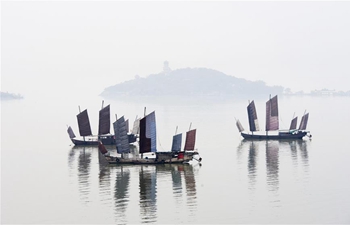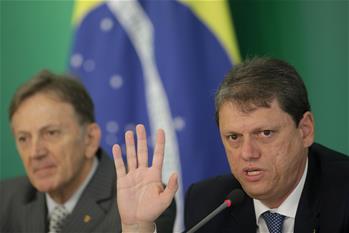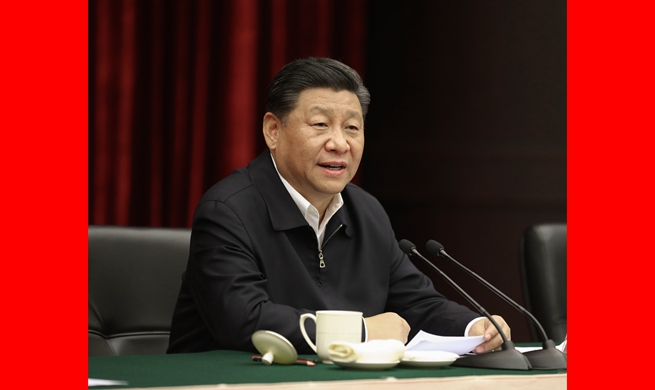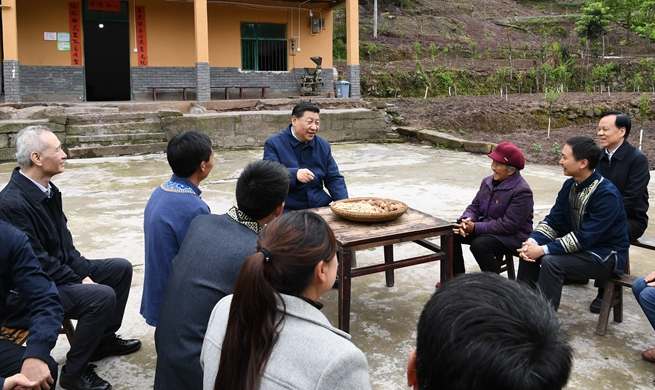by Ronald Ssekandi
KAMPALA, April 17 (Xinhua) -- In Uganda, China is among others financing the transformation of the African country's customs department, a key factor that the World Bank says is critical in financing the country's economic development in the face of dwindling donor support.
The World Bank said in its 2018 Uganda Economic Update that tax collections currently account for 14 percent of the country's gross domestic product (GDP), lower than regional peers, and short of the government's target of 16 percent.
Informality, tax exemptions, and inefficiencies in revenue collection deny the country up to 40 percent of revenue, according to the report.
CHINA'S ASSISTANCE
China is Uganda's major trading partner with imports from the Asian country amounting to 24 percent of the total imports to Uganda, according to Uganda Revenue Authority (URA), the government tax body.
Uganda also ranks third in Africa as the destination of China's Foreign Direct Investments, according to China's ministry of commerce.
All this calls for an efficient tax system that will further facilitate the trade and investment between the two countries.
In June last year, Uganda got assistance from China to modernize the customs department.
According to Uganda's finance ministry, China would provide non-intrusive scanners, modernized customs risk management, supervision and communication system, capacity building, customs service and enforcement support, among others.
Dicksons Kateshumbwa, Commissioner Customs at URA, told Xinhua in an interview on Wednesday that Uganda is already reaping benefits out of this cooperation.
Kateshumbwa said URA sends some of its officers to China for further training, especially in new areas of technology. Chinese customs officials also come to Uganda and share their expertise with their Ugandan counterparts.
"We have had increased capacity building for our staff but also we have acquired some of the latest technology from China," he said, noting that seven new scanners from China will arrive at the Kenyan seaport of Mombasa this week destined for Uganda.
He said the scanners would be installed to supplement the existing ones at the country's critical borders.
The scanners will strengthen URA's capacity to detect any concealment, which would directly result into increased revenue and management of risks and security, according to the Commissioner.
URA and China's customs are piloting an electronic system where they will exchange the certificates of origin of goods instead of doing it manually.
"We are cooperating on integrating our certificates of origin. When you export goods, you have certificates of origin which confirm the origin status of goods for purposes of tax treatment," Kateshumbwa said, noting that the move would quickly facilitate trade and investment.
Uganda and China through the World Customs Organization (WCO), last year signed an agreement on mutual Authorized Economic Operator (AEO) status.
Kateshumbwa said the move aims at strengthening trade facilitation between the two countries.
Under the agreement, companies that obtain the AEO status in the two countries will enjoy simplified customs procedures, such as reduced examination or prioritized clearance, when they export products to the other country.
According to WCO, an AEO is an organization or company involved in the international movement of goods that has been certified by, or on behalf of, a national customs administration and complies with WCO or equivalent supply chain security standards.
To boost domestic tax revenue collection, URA has procured the services of Chinese firm Aisino Corporation to provide electronic tax solutions.
The Electronic Fiscal Receipting and Invoicing Solution, according to URA, seeks to mitigate tax administration shortfalls while promoting efficiency.
URA faces challenges in tax administration including poor record keeping, fabricated tax invoices and incomplete disclosure of business transactions.
"This is an initiative that is meant to strengthen our domestic taxes ability to detect the correct income that is declared," Kateshumbwa said, noting that the service will start next financial year 2019/20.
"The idea is that we want to increase our revenues because as a country we have moved a long way from donor reliance to more of getting our revenues. You cannot expect foreigners to give you money to develop your country," he added.













